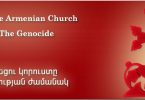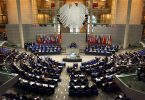Genocide Recognition – Then What?
|
What could recognition mean?
does it mean achieving regional peace by disgorging the fruits of this poisonous tree and undoing Ataturk’s post-Genocide land grab by restoring Karabagh (and Nakhichevan?) to Armenia?
|
It is 89 years since April 1915 when 1.5 million Armenians were slaughtered “because they were inconvenient.” Such is the banality of evil.
In a better world, the perpetrators might have made amends and their allies might have encouraged them to do so. But we live in this world, where sadly, truth yields to expedience, and justice to interests. Allies harden the hearts of the perpetrators and preach the big lie; nations are eradicated, indigenous people are corralled into reservations and cultures obliterated. Convenient counterbalancing truths are manufactured and propagated to the oblivious masses awash in their daily dousing of reported atrocities.
Ten years ago in some countries diplomats were forced to resign for calling what was going on in Bosnia ‘genocide’ and a few years later they were commended for prosecuting the crime. This is a strange inversion of the Armenian situation, where what happened to the Armenians was the paradigm for the UN Genocide Convention ordained by all the Allied powers, including the United States and United Kingdom, which now stammer in applying the word to the Armenian case.
One of the things that makes commemorating the Armenian Genocide more poignant even after 89 years is that there are still those who do not want to remember with us.
I have sometimes asked diplomats whether they even bother to ask their Turkish counterparts to tell the truth about the Armenian Genocide. They usually blush or find the question too direct and naive to be worth an answer. Yet there is a kind of 19th-century racism in this policy of Turkish exceptionalism: This notion that Turkish relations are too fragile for the truth, that Turks cannot be expected to face their history, and that the Armenians are just not worth the discomfort. But why the charade? No one denies that the territory now called Turkey was inhabited by Armenians and Greeks for thousands of years before Turks migrated there, or that Armenians peacefully made their home there since time immemorial, until it was ethnically cleansed for Ataturk to create the modern state of Turkey.
The 20th century was the century of mutual annihilation and the big lie – not something to be proud of. I wonder whether the day will come when those who counsel Armenians that the lie costs less than the truth will with the same forthrightness tell Turkish groups and officials, “Our experience teaches us that the truth costs less than the lie. The truth will set you free.” For all we know, the Turks might find it a relief to have the truth out in the open. They might find commemorating more tenable than covering up.
Some say the issue is not the truth, but its consequences. As a linguist and attorney, I find this plausible. An admission of guilt is a unique kind of speech act, characterized not only by the factual statement, that is, the truth it expresses, but also by the consequences it entails. Armenians often say they just want the truth, while Turks refuse, because they do not want the consequences. Assuming this is part of the resistance to recognition, clarification of consequences may facilitate a statement of the truth. What could recognition mean?
- does recognition mean an apology, reconciliation and normal relations, or more?
- does recognition mean symbolic land reparations, such as the return of Mount Ararat and the medieval Armenian capital of Ani, or does it mean less or more?
- does it mean preservation of and access to Armenian religious, cultural and historic sites in Turkey?
- does it mean free access for Armenia to the Black and Mediterranean Seas? does it mean fair use of water resources in the region?
- does it mean protection of the Armenian Patriarchate of Constantinople and the remaining Armenian population of Turkey?
- does it mean a multilateral pact that guarantees Armenia’s security?
- does it mean monetary reparations for victims and their confiscated properties?
- does it mean achieving regional peace by disgorging the fruits of this poisonous tree and undoing Ataturk’s post-Genocide land grab by restoring Karabagh (and Nakhichevan?) to Armenia?
- or does it mean something entirely different?
The Old Testament teacher in Ecclesiastes says “to everything there is a season, for everything a time.” After 600 years of statelessness, it is time to build a new Armenia. With a new century and a new millennium, it is also time to resolve this injustice not only for the Armenians and Turks, but also for the US, UK and other countries. It is time to resolve, not cover up, a time to transcend, not dissimulate.
(Based on prepared remarks for the 85th Anniversary of the Armenian Genocide at the John F. Kennedy Museum – April 2000, published in AIM Magazine (April 2004)).







